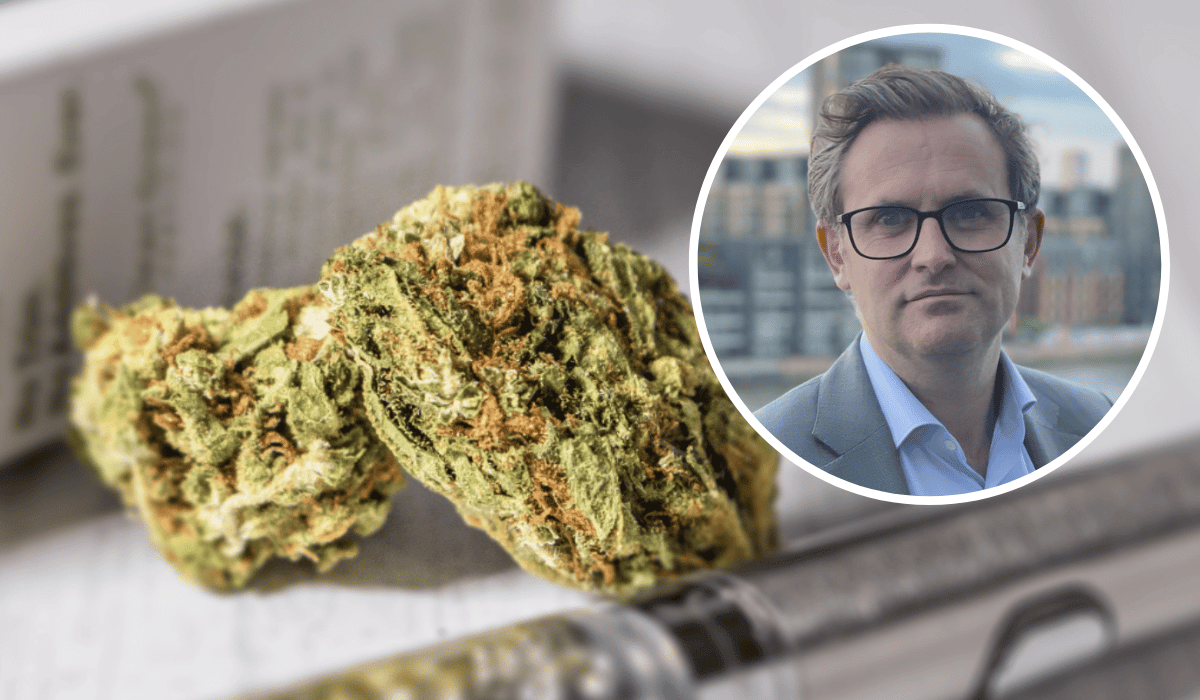One of Europe’s leading cannabis researchers speaks to Cannabis Health about the future of the field and the importance of drawing on patients’ perspectives when it comes to cannabis-based drug development.
Dr Mikael Sodergren knows more than many when it comes to the vast potential in the field of cannabis-based medicine.
As founder of Sapphire Medical Clinics and head of the Medical Cannabis Research Group at Imperial College London, Dr Sodergren has played a fundamental role in helping to advance the European sector.
He set up the UK Medical Cannabis Registry – one of the largest registry-based databases of clinical outcomes of cannabis patients in Europe – and has led preclinical research into the role of cannabinoids and other cannabis-derived compounds from the cannabis plant for the treatment of pain, inflammatory disorders and cancer.
He is also chief medical officer at global cannabis company, Curaleaf International, where he is responsible for leading the clinical and pre-clinical cannabinoid research programme in Europe and for the cannabis clinic roll-out across the continent.
On Wednesday 3 May, Dr Sodergren took to the stage at Cannabis Europa in London, to share his insights on the future of this new field of medicine. Ahead of the event, he spoke to Cannabis Health about the unique opportunities and challenges it presents.

Dr Mikael Sodergren, chief medical officer at Curaleaf International
CH: Would you mind telling us a bit about how you got into the field of cannabis medicine?
Dr M Sodergren: I am a clinical academic and specialist liver and pancreas cancer surgeon and have been interested in therapies that modulate the immune system for the treatment of cancer for the last decade. It was on this basis I became interested in CBD which has some unique anti-inflammatory properties. By the very nature of surgery, I also have an interest in pain relief, and I have had patients enquire about the role of medical cannabis for many years.
CH: What can you tell us about Curaleaf’s cannabinoid drug development programme and the research which is currently being undertaken?
MS: Cannabis-based medicine drug development is really interesting because we can leverage the real-world evidence that we collect through patients being treated in the UK and beyond and use this to inform the drug development process.
Similar to traditional drug development programmes, Curaleaf International has a network of academic collaborations across Europe where we conduct preclinical research to understand and optimise our medicines. For example, we are currently in the process of evaluating not just cannabinoids but also specific terpenes found in the cannabis plant in petri dish models to understand what combination of these compounds produce the best analgesic effects as painkillers.
When these medicines are prescribed to patients we can further refine this process using the feedback from the real-world data that we collect which documents clinical outcomes, efficacy measures, patient-reported outcomes and adverse events. This kind of feedback loop is unique in drug development and we feel it is one that we can uniquely deploy at Curaleaf International to develop the medicines which will help patients the most. We have a real data-driven focus grounded in science which will hopefully benefit our patients and ultimately lead to more drugs becoming licensed, and provide quality cannabis for all that is both safe and effective.
CH: So, the patient experience is a key factor in your research and business strategy?
MS: We place patients at the centre of everything we do and the UK Medical Cannabis Registry is a good example of this. It is vital that we use patient-reported outcome measures not only in the drug development process but also as a guide for what is important in designing clinical trials.
CH: There are increasing numbers of companies entering the market now, how can you ensure Curaleaf continues to meet the needs of patients?
MS: Curaleaf has spent the last decade driving the cannabis health movement, providing patients with quality and consistent products they can rely on. We have spent many years setting up the pre-clinical research infrastructure to, for example, adapt and optimise laboratory assays specifically to cannabis-based medicines and we now have a drug development experimental pipeline which is robust, reproducible and pretty comprehensive for many conditions such as chronic pain.
Furthermore, we can complement these data with the real-world evidence dataset available through the UK Medical Cannabis Registry to further refine the medicines to ensure that they have the clinical characteristics that we anticipate. We hope that these data in themselves can support product registrations in due course.
READ MORE: UK Medical Cannabis Registry – what does the latest data say?
CH: What are the current challenges for companies operating in the medical cannabis space? And how can we overcome them?
MS: There have been issues around protecting the IP associated with cannabis-based therapies and how to effectively prove efficacy through clinical trials. I think these can largely be resolved, however many medical cannabis companies are not resourced to carry out clinical trials in the same way as the pharma and biotech industry so there is a need to foster collaborations and partnerships to ensure that we deliver medicines to regulators which they can licence in the same way as other treatments. Better regulation of the current medical cannabis market and clarity on ‘grey areas’ would also help ensure all providers are improving and progressing in the right direction, allow greater education of the public, and in turn, increase funding and access from governments.
CH: What new innovations do you expect to be important in the coming years?
MS: I think that modes of administration will become increasingly interesting in cannabis-based medicines and we are likely to see the introduction of more conventional methods that doctors are more familiar to prescribe. I think that as we gain a greater understanding of the compounds that have clinical effects in the plant we will be able to refine the therapies to greater clinical efficacy.
CH: Where do you see the medical cannabis sector in the next five years?
MS: I think we will see a few medicines receiving market authorisation, but globally we are still behind in the research process with plenty of work left to do so it is a welcome sign that agencies such as the NIH or NIHR have declared they have funding specifically to advance research in these areas. Ultimately, education around medical cannabis needs to accelerate. This will increase understanding and acceptance among society and governments, and improve access for all.
Dr Sodergren was interviewed as part of the session: The Changing Role of European Pharma at Cannabis Europa 2023. The full recording will be available on the Cannabis Europa YouTube channel in the coming weeks.

 News6 months ago
News6 months ago
 Science5 months ago
Science5 months ago
 Industry6 months ago
Industry6 months ago
 News6 months ago
News6 months ago
 News5 months ago
News5 months ago
 Health5 months ago
Health5 months ago
 News5 months ago
News5 months ago
 Health3 months ago
Health3 months ago













